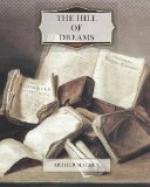Lucian pigeon-holed the letter solemnly in the receptacle lettered “Barbarians.” He felt that he ought to ask himself some serious questions: “Why haven’t I passed fifth? why isn’t Philip (son of Sir John) my most intimate friend? why am I an idler, liable to fall into bad habits?” but he was eager to get to his work, a curious and intricate piece of analysis. So the battered bureau, the litter of papers, and the thick fume of his pipe, engulfed him and absorbed him for the rest of the morning. Outside were the dim October mists, the dreary and languid life of a side street, and beyond, on the main road, the hum and jangle of the gliding trains. But he heard none of the uneasy noises of the quarter, not even the shriek of the garden gates nor the yelp of the butcher on his round, for delight in his great task made him unconscious of the world outside.
He had come by curious paths to this calm hermitage between Shepherd’s Bush and Acton Vale. The golden weeks of the summer passed on in their enchanted procession, and Annie had not returned, neither had she written. Lucian, on his side, sat apart, wondering why his longing for her were not shaper. As he though of his raptures he would smile faintly to himself, and wonder whether he had not lost the world and Annie with it. In the garden of Avallaunius his sense of external things had grown dim and indistinct; the actual, material life seemed every day to become a show, a fleeting of shadows across a great white light. At last the news came that Annie Morgan had been married from her sister’s house to a young farmer, to whom it appeared, she had been long engaged, and Lucian was ashamed to find himself only conscious of amusement, mingled with gratitude. She had been the key that opened the shut palace, and he was now secure on the throne of ivory and gold. A few days after he had heard the news he repeated the adventure of his boyhood; for the second time he scaled the steep hillside, and penetrated the matted brake. He expected violent disillusion, but his feeling was rather astonishment at the activity of boyish imagination. There was no terror nor amazement now in the green bulwarks, and the stunted undergrowth did not seem in any way extraordinary. Yet he did not laugh at the memory of his sensations, he was not angry at the cheat. Certainly it had been all illusion, all the heats and chills of boyhood, its thoughts of terror were without significance. But he recognized that the illusions of the child only differed from those of the man in that they were more picturesque; belief in fairies and belief in the Stock Exchange as bestowers of happiness were equally vain, but the latter form of faith was ugly as well as inept. It was better, he knew, and wiser, to wish for a fairy coach than to cherish longings for a well-appointed brougham and liveried servants.




